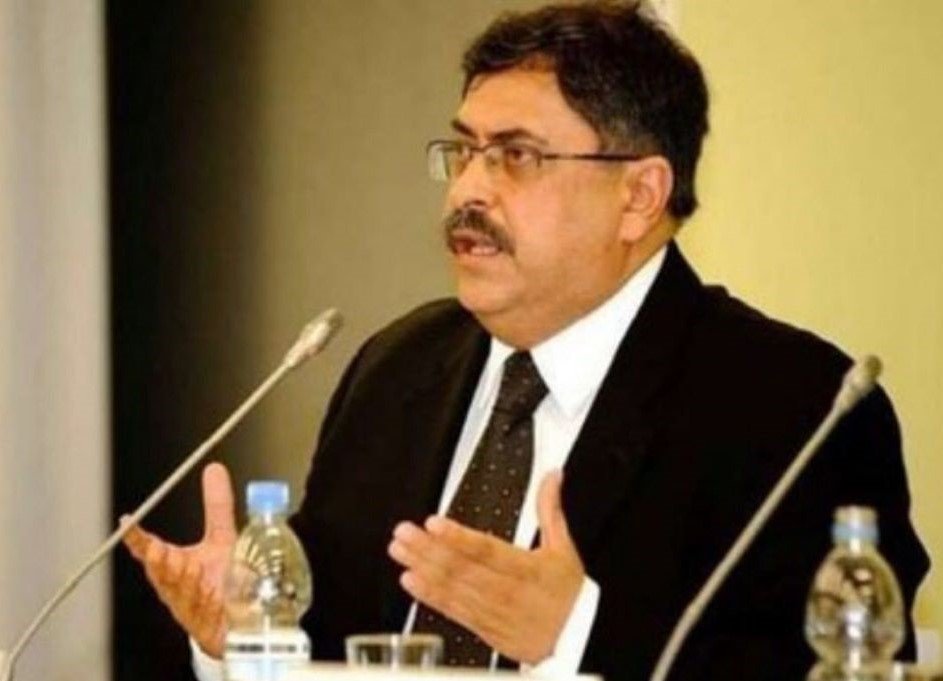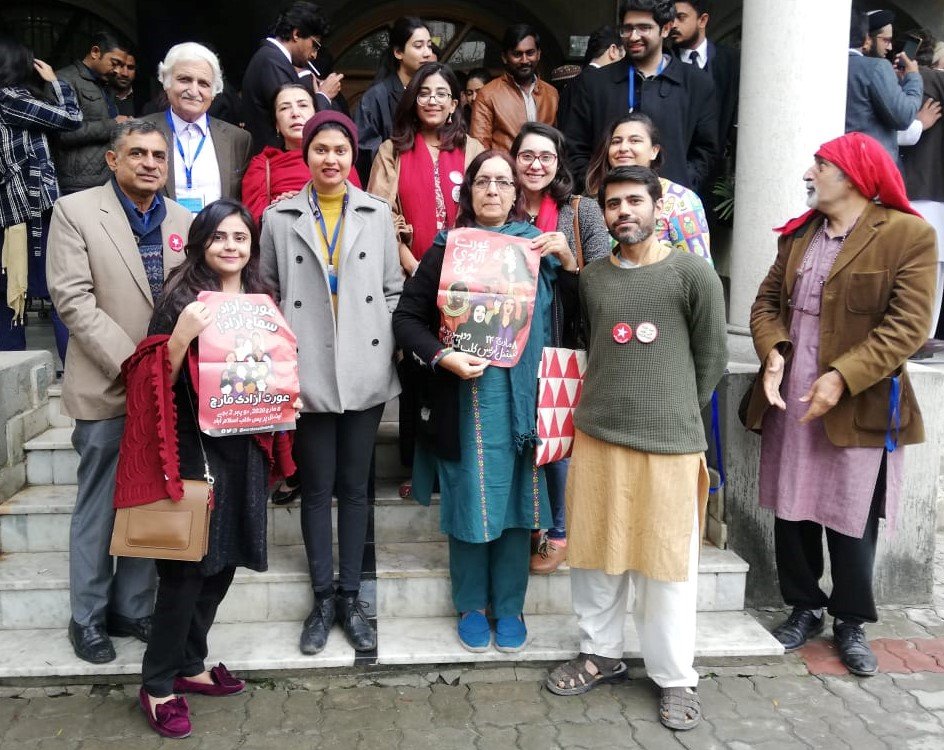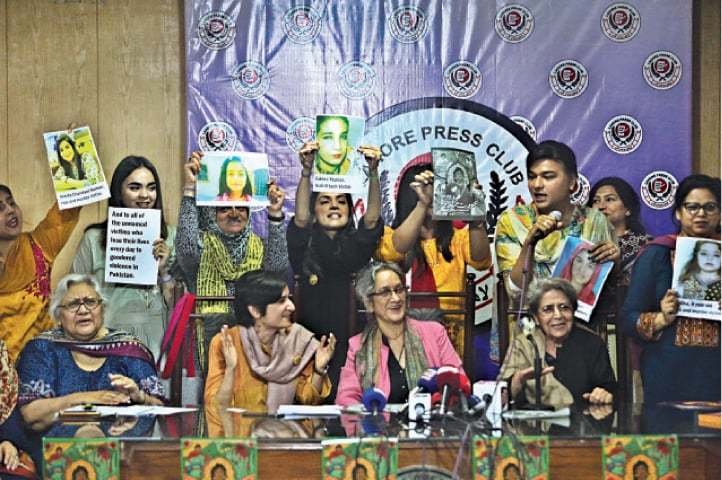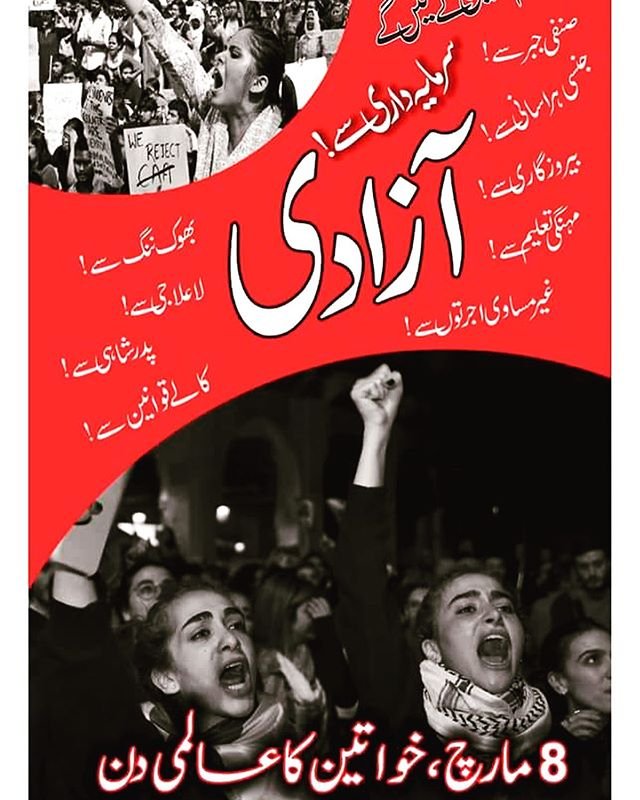
Tribal mindset has taken over society, says CJ Minallah, emphasizing that it is important to see Aurat March in a positive light
High Asia Herald Report
The Islamabad High Court (IHC) on Friday dismissed a petition seeking a ban on the Aurat March, scheduled for Sunday, to mark the International Women Day.
“In our society, various Islamic laws are being seriously violated. The court hopes that the petitioner also approaches it for the enforcement of all these Islamic laws,” remarked Justice Minallah during the hearing of the petition.
Commented on the controversial slogan ‘mera jism, meri marzi (my body, my choice), CJ Minallah asked that how come someone interpret the slogan differently while saying that ‘you’re wrong’ if the organisers have been continuously interpreting the slogan and saying that its meaning is different.”The women’s slogans are that they be given the rights that Islam has guaranteed them. Can we interpret their slogans by ourselves?” the judge questioned.

“It is important that you see the Aurat March in a positive light. On your own, how can you interpret these slogans?”
Justice Minallah said if anything against the law happened on March 8, legal action would be taken at the time, your plea seeking relief is premature.
He cited the Aurat March manifesto announced by organisers in a press conference in Lahore on Thursday wherein they were asking for the rights granted to them by Islam.
“When they made themselves clear in their press conference then how can we have different interpretations?” Justice Minallah asked.
The judge also questioned the petitioners’ counsel on how many women in the country were given the right to an inheritance, alluding to the difficulties they face despite clear Islamic laws in place.
During the proceedings, the petitioners’ lawyers informed the court that they completely supported women’s rights, adding that they were not opposed to the march or to the rights of women.
They pleaded for the court to pass an order that the march is conducted within the ambit of the law, Constitution and Islam.
Chief Justice Minallah said the organisers of the march have been demanding the implementation of their fundamental rights that Islam has given to them but denied by the society.
“Have you read the demands issued by the organizers circulated widely in media,” observed CJ Minallah. He went on to question the petitioner, “have you been and able to highlight anything unconstitutional or unIslamic in the demands? On what basis can you hypothesize that there demands and slogans are bound to be unIslamic? Do you have any evidence to support your claim?”
The Aurat Azadi March organizers have already clarified the meaning of the slogans being impugned and how they fall within the rights already granted by the Constitution of Pakistan and by Islam. How can the petitioners attribute negative meaning to them?”, asked CJ Minallah.
In our society, women are denied their rights guaranteed by the law and by Islam, including the inheritance rights, but no petition has ever been brought for the enforcement of those rights.
f

“Had you come to me with a petition saying none of the rights given by Islam are being implemented in our society, such as the Law of Inheritance, this would have been more meaningful,” he told the petitioners counsel.
He further said that the people should be looking at revolutionizing society, not pulling it backward.
LHC ALSO THROWS OUT PLEA
Earlier on Tuesday, the Lahore High Court disposed of a petition against the holding of Aurat March, reiterating its earlier remarks that the gathering could not be stopped under the Constitution and directing the Lahore district authorities to speed up their decision on an application seeking permission to hold the march.
The petition, filed by Judicial Activism Council Chairman Azhar Siddique, had claimed: “there are various anti-state parties funding the march with the sole purpose of spreading anarchy in public.”
LHC Chief Justice Mamoon Rashid Sheikh said “under the law and Constitution of the country, the Aurat March cannot be stopped” but went on to add that the marchers should “refrain from hate speech and immorality”.
Nighat Dad – a digital rights expert and activist who is defending the holding of the march in court – told the petitioner: “You wrote in your petition that the march is anti-state, which is a very dangerous claim.”
“Women are the beauty of our society. Then they talk about slogans like ‘Mera jism, meri marzi’ (my body, my choice). The perception in the world is that we oppress our women,” Siddiqui responded.
The LHC chief justice said: “There are no two opinions about women’s rights and it is the responsibility of the organisers of the Aurat March to ensure that no immoral slogans are raised at the march.”
“The organisers and participants of the march should remain within the ambit of the law. The police DIG Operations has assured foolproof security for the march,” Justice Sheikh said.
What is the Aurat March?
The ‘Aurat March’, as it has come to be known since its first iteration in 2018, was organised by Hum Aurtain — a feminist collective. It has a manifesto demanding basic rights for women in each field of life.
For the past two years, it has been organised to coincide with the International Women’s Day on March 8, which is also the scheduled date for the rally this year.
Last year, the holding of the rally led to a backlash against the organisers and participants for “violating Islamic principles” and “disrespecting women”. Most critics had issues with the placards and banners used during the march, which they said transgressed Pakistan’s cultural values. There were also reports of the organisers of the march receiving threats on social media.

Core body presents demands
The Aurat March manifesto was launched formally on Thursday at the Lahore Press Club, revolving around ‘Khud Mukhtari’ or the independence of women.
The 15-point manifesto demanded an end to the IMF-sponsored economic policies and budget cuts as well as immediate control of inflation of basic foods, whose burden was felt by working-class women as well as by gender and sexual minorities. It demanded a minimum of Rs40,000 fixed wages for workers, reported Dawn.
The committee explained the bodily rights. “Demanding bodily rights is a basic human right, regardless of age.”
“It extended to children as well, and was especially important to think of with regards to the widespread incidents of child sexual abuse and murder, all over the country.”
Farida Shaheed said it was obvious that those who proudly claimed they were anti-Aurat March did not even understand what the slogan meant.
At one point when journalists’ arguments began growing louder, she asked them, “Who has a right over your bodies?”
There was no reply. “Out of 15 points of the manifesto, they found only one to talk about,” said Ms Shaheed.
“They seem to be quite insecure and afraid about this side of the conversation. When you talk about human rights, we are referring to a person, and his or her body,” she said.
“We speak of rape cases and sexual harassment even of little girls, yet no one thinks of all that.”
Another core body member Neelum Hussain said that when demands challenge the status quo, there is always fear. “Journalism is male-dominated and so they did not want to listen to our demand.”
Activists also mentioned double standards of society, saying that when Khadim Rizvi was swearing on TV, and when there was a degradation of women, no one rose against that.
Other points of the manifesto demanded that safe and equal workplaces be provided through criminalisation of discrimination, defamation laws be decriminalized, domestic violence be criminalised in all territories, anti-harassment laws and sexual assault laws be amended to and include all genders to be complainants, concrete actions be taken to curb child sexual abuse and exploitation, campuses be demilitarised and surveillance of students be ceased, justice for all the families of those who have been victims of enforced disappearances, Kashmiris’ right to self-determination be upheld, community-led truth and reconciliation commissions be made to deal with violence by state and non-state actors, the Transgender Persons (Protection of Rights) Act, 2017 be implemented, all laws impinging on civic freedoms be repealed, and the preservation of, and transparency from big corporations on the use of, our natural resources.
A representative of the core committee told media: “After the dismissal of the Lahore High Court petition, it has been determined that we are a peaceful and legitimate march.”
“We are however still waiting for the city administration to give us our NOC in accordance with our Constitutional rights.”
Prominent representatives of the transgender community were also present.

The High Asia Herald is a member of High Asia Media Group — a window to High Asia and Central Asia

